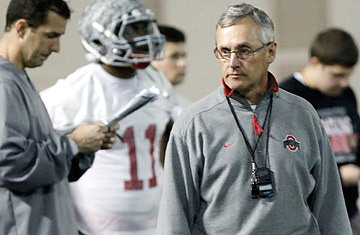
Former Ohio State head coach Jim Tressel, right, walks away as assistant head coach Luke Fickell, left, looks over a list of plays
It's no secret that sports is all about leadership, whether that leadership comes from the best athletes, coaches or even commissioners and owners. Their voices are sturdy and commanding in the huddle or boardroom. They lead and teach by example, and they usually make the difference between winning and losing.
There are plenty of gifted sports leaders, especially among the players. LeBron James, Derek Jeter and Peyton Manning, for example, are naturals. After June 2's classic Game 2 of the NBA Finals, in which Dallas erased a 15-point deficit over the last seven minutes to win 95-93 and tie the series, who wouldn't want to rally behind Dirk Nowitzki?
But at the very top of some significant sporting institutions these days, we're witnessing a stunning leadership void. And if it continues, the results could be disastrous.
The Jim Tressel saga, for instance, won't inspire much confidence in the multimillionaire coaches who are the public faces of many universities. Tressel, the Ohio State head football coach who resigned under pressure on May 30 after lying to school administrators about his prior knowledge of players' trading memorabilia for cash and tattoos — and before a Sports Illustrated story alleged that the misconduct was much broader than previously believed — was phony. He penned a book, The Winners Manual, that espoused strong character and the moral high ground. "Discipline is what you do when no one else is looking," Tressel wrote. Turns out, Tressel wrote the book on hypocrisy.
Tressel's misdeeds, however, should raise more-important questions about the role sports play in higher education. Where was the leadership of Ohio State president Gordon Gee, a man who abolished the athletic department at Vanderbilt in an effort to better meld athletics with academics yet seemed to cater to Tressel's whims once he got to a big-time football school like Ohio State — even as the allegations against Tressel began to pile up over recent months? "I hope he doesn't fire me," Gee infamously stated in March, as the charges against Tressel were growing more severe, when asked if he would consider firing the coach. A college president — president — actually said that, in public? That's leadership?
And there's a broader problem. The salaries for college football and basketball coaches keep skyrocketing. And as long as these multimillion-dollar contracts are available, coaches will have huge incentives to skirt the rules. Which college president is going to stop using the market as an excuse and refuse to overpay for a college coach? Who is going to resist the catcalls of the boosters and alums and make the fiscally responsible choice to funnel some of those millions into actual education? College coaching is a consuming, and risky, career. You could get fired in a couple of years. The coaches deserve hefty compensation, but for every $2 million coach out there, there are dozens if not hundreds of qualified candidates who can also do a great job for a fraction of that price. And where is the NCAA? Shouldn't that organization be trying to get to the root of the problem of so-called corruption and admit that the young athletes bringing in millions to these universities aren't "amateurs"? That if you shared the wealth, maybe they wouldn't be hanging out with shady tattoo dealers to grab some extra spending cash?
Still, it's one thing for college sports, a uniquely American obsession, to be broken. It's quite another for the world's most popular sport to be so screwed up. If global soccer can't install a functional, professional leadership structure, what does that say about the state of sports leadership? FIFA, the world soccer governing body, is engulfed in scandal. High-level officials have been accused of offering money in exchange for votes in the organization's presidential election. Sepp Blatter, president of FIFA, was accused of knowing about these bribe offers, though an ethics committee eventually cleared him. The integrity of the decision to award the 2018 and 2022 World Cups to Russia and Qatar, respectively, has been called into question: in an e-mail, FIFA's general secretary wrote that Qatar "bought" the vote. (The official explained that he was just referring to Qatar's well-financed campaign.)
